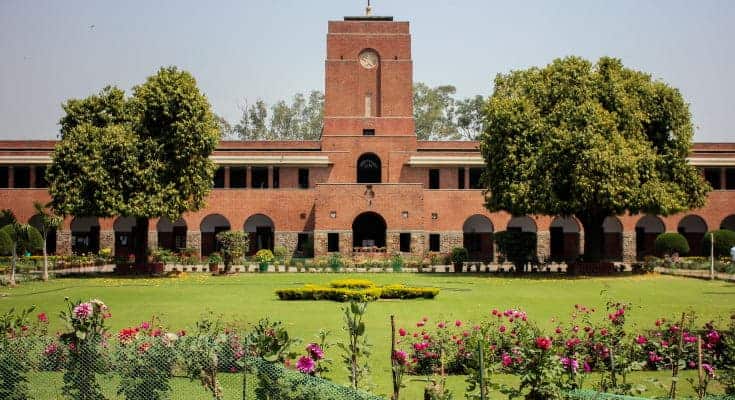University of Delhi stands at the risk of getting its funds curtailed due to the non-signing of the Memorandum of Understanding with the centre and the University Grants Commission.
University of Delhi (DU), once again, stands on the verge of fund cuts. This time around, it is due to the non-signing of Memorandum of Understanding (MoU) with the centre and the University Grants Commission (UGC).
As reported by the Hindustan Times, the Ministry of Human Resource Development (MHRD) and the UGC entered into a pact with varsities laying down several parameters for them, during the last academic session. The MoUs lay down achievement targets and also form the basis of grants allotted to the institutions. The various parameters highlighted in the pact are related to the various targets, such as filling up vacancies, utilisation of resources, output targets in terms of programme of work, and action plan among others.
Rule 229(11) of the General Funancial Rules states, “autonomous organisations as also others with a budgetary support of more than INR five crores per annum, should be required to enter into a MoU with the administrative ministry or department, spelling out clearly performance parameters, output targets in terms of details of programme of work and qualitative improvement in output, along with commensurate input requirements.”
The rule further states, “The output targets, given in measurable units of performance, should form the basis of budgetary support extended to these organisations. The roadmap for improved performance with clear milestones should form part of the MoU.”
DU remains the only significant exception among all the 40 central universities which have signed the MoU with the centre and the UGC. Thus, it stands at a risk of getting its funds curtailed.
A senior official from UGC discussing the issue and the University’s stand on the same said, “Like last year, the tripartite MoUs are being signed again and most varsities have already entered into these pacts. However, DU continues to be an exception. Since, the varsity has not signed it, its funding can be curtailed. However, in a recent meeting the Vice Chancellor has assured that he would try to get the proposal cleared through the varsity’s executive council to pave way for the pact to be signed.”
The risk stands valid ‘technically’ but the same issue arose last year when DU failed to sign the MoU. But, keeping in view the interest of the students, UGC didn’t take the step ahead in curtailing the funds. But, if the same leniency would be granted to the University this time around too is something which looks doubtful.
If this step of stopping the funds of the University is indeed taken, the students are bound to get affected as the subsidized fees of DU has made it possible for various students from relatively low income families to access the academics and facilities due to their merit. But, curtailing of funds would see a sky high increase in fees, making it almost impossible for such students to sustain in the University.
Finding the clauses and demands of the MoU unacceptable, Saikat Ghosh, a member of the academic council of Delhi University spoke to DU Beat. He said, “DU is entitled to adequate public funding as it is a premier public university imparting higher education to lakhs of students.The MHRD cannot bully DU into accepting unreasonable parameters and targets – that is simply bureaucratic interference of the meanest kind. As a public university, DU should not be browbeaten into accepting the clauses that demand incremental hikes in student fees and self-financing courses. DU has the statutory freedom to decide on its own targets and achievement parameters. It will not sign an MoU that encroaches on this freedom and allows politicians, bureaucrats and industrialists an upper-hand over its students and teachers in decision-making. The MHRD’s threats are condemnable and will continue to be resisted.”
On talking to DU Beat, Abha Dev Habib, a member of Delhi University Teachers’ Association said, “DUTA has been opposing signing of Tripartite MoU. The meeting of the Executive Council where it was placed was stalled. Tripartite MoU aims at restructuring higher education in terms of their funding. Central and State Universities are being arm twisted in signing this MoU, which requires universities to steadily increase student intake and fees. However, there is no commitment to provide grants for additional infrastructre or teaching- non teaching staff to cater to any such increase in number of students. This MoU is a way of withdrawing public funding and pushing the burden of maintaining or expanding Central and State universities on parents and students.”
The University and the UGC need to come in a common agreement so as to safeguard the interests of the students.
Feature Image Credits: Niharika Dabral for DU Beat.
Shreya Agrawal
[email protected]











